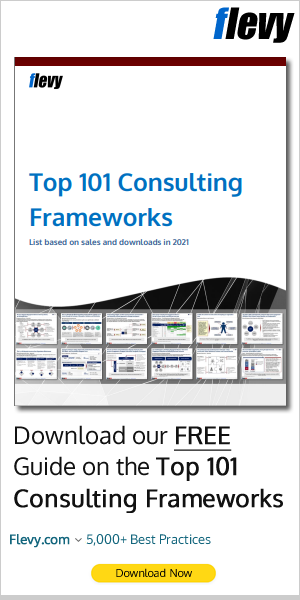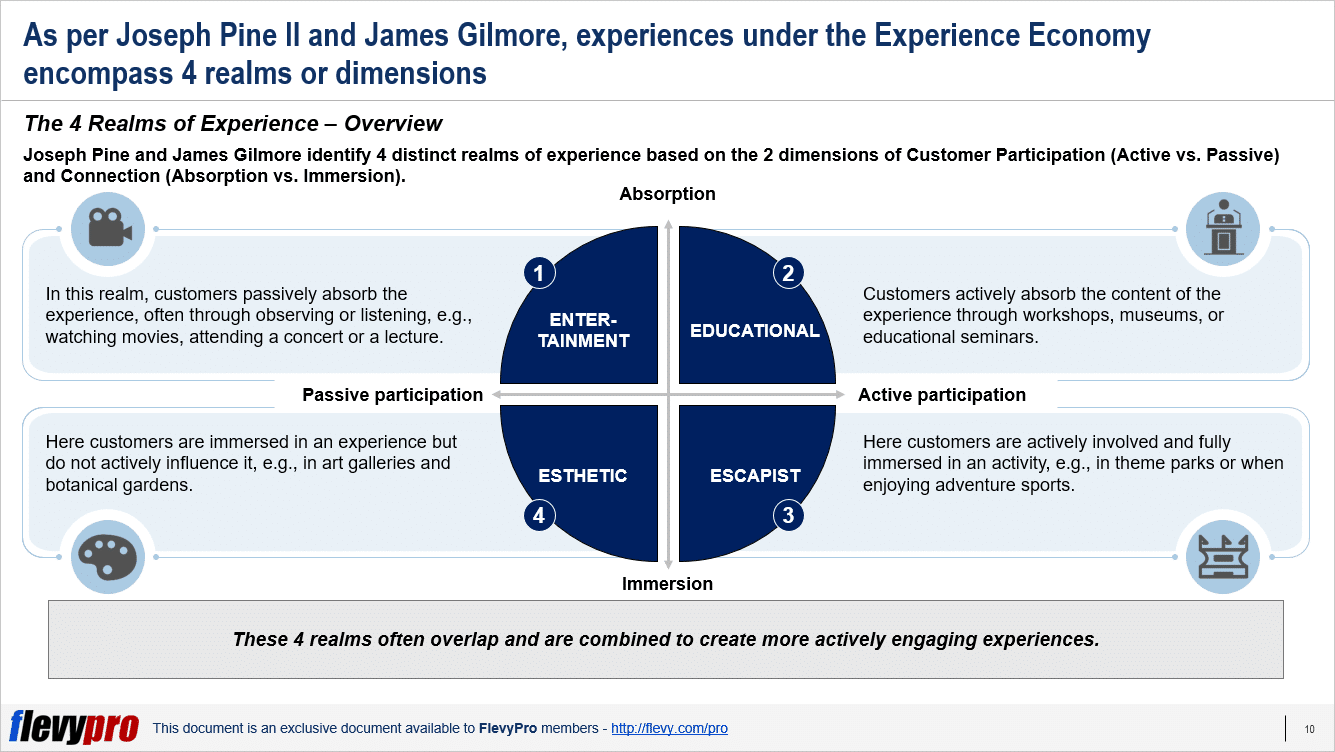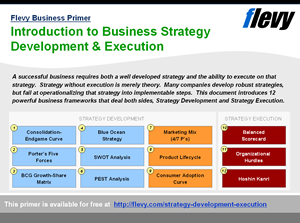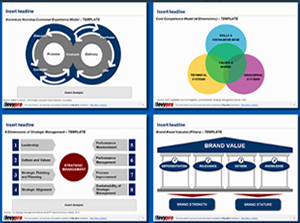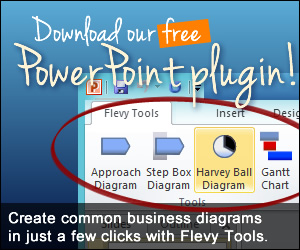Editor's Note: Take a look at our featured best practice, Digital Transformation Strategy (145-slide PowerPoint presentation). Digital Transformation is being embraced by organizations across most industries, as the role of technology shifts from being a business enabler to a business driver. This has only been accelerated by the COVID-19 global pandemic. Thus, to remain competitive and outcompete in today's fast paced, [read more]
Experience Economy
Also, if you are interested in becoming an expert on Customer-Centric Design (CCD), take a look at Flevy's Customer-Centric Design (CCD) Frameworks offering here. This is a curated collection of best practice frameworks based on the thought leadership of leading consulting firms, academics, and recognized subject matter experts. By learning and applying these concepts, you can you stay ahead of the curve. Full details here.
* * * *
The concept of the “Experience Society” is a social and economic evolution where experiences, rather than goods or services, become the primary products of society. This idea has been influenced by various theorists, including Alvin and Heidi Toffler.
The Tofflers’ analysis of societal evolution lays the groundwork for understanding the shift to an experience-focused society. Their prediction of a move towards a knowledge- and information-based society preempts the importance of experiences in the modern economy.
Experience Society emphasizes the emotional and psychological aspects of consumerism. It reflects broader cultural and social changes, where personal fulfillment and experiences become central to lifestyles and identity.
Popularized by B. Joseph Pine II and James H. Gilmore in their 1998 Harvard Business Review article and subsequent book, the concept of “Experience Economy” goes beyond the traditional focus on goods and services.
Pine and Gilmore argue that economies evolve in stages: from agrarian to industrial, to service, and finally to customer experience. They postulated that organizations should create compelling, emotionally-resonant experiences for their customers, and the memory of those experiences itself should become the product.
The Experience Economy emphasizes the Transformation from traditional product and service offerings to creating rich, memorable experiences. This Transformation reflects a deeper understanding of consumer desires and the value of emotional engagement in business. For instance, Disney World is a classic example where the experience of magic and wonder is as much the product as the rides themselves. Likewise, stores like Apple and IKEA focus on creating amazing customer experiences through store layout, product interactions, and overall ambiance.
Joseph Pine and James Gilmore identify 4 distinct realms of experience based on the 2 dimensions of Customer Participation (Active vs. Passive) and Connection (Absorption vs. Immersion).
- Entertainment (Passive Absorption)
- Educational (Active Absorption)
- Escapist (Active Immersion)
- Esthetic (Passive Immersion)
These 4 realms often overlap and are combined to create more actively engaging experiences.
Let’s dive deeper into the first two realms of experience, for now.
Realm 1: Entertainment (Passive Absorption)
The Entertainment realm plays a crucial role in how businesses engage with consumers through passive, yet emotionally engaging experiences. Consumers in this realm are primarily in a receptive mode, observing or listening rather than actively participating. These experiences provide pleasure to consumers by evoking emotions like joy or excitement. Entertainment involves narratives and storytelling that capture the audience’s imagination through theater, music, or any form of artistic expression.
Although the participation is passive, the experiences engage multiple senses—sight, sound, and sometimes even smell and touch—to enhance the immersive aspect. Entertainment experiences have a broad appeal as they require minimal effort from the audience, making them accessible to a wide demographic. These experiences have a profound emotional impact, creating lasting memories. Entertainment drives substantial economic value through media, events, and performances.
Realm 2: Educational (Active Absorption)
The Educational realm of the Experience Economy emphasizes active participation and engagement in experiences related to learning or acquiring new skills, creating an interactive and stimulating learning environment along the way. The participants’ active involvement in the learning process deepens their learning experience. Educational experiences take many forms to make learning enjoyable—e.g., workshops, seminars, guided tours, or interactive exhibits.
These experiences engage the consumers’ minds, requiring analysis or problem-solving, stimulating intellectual curiosity, and challenging them mentally. These experiences cater to various learning styles—visual, auditory, or kinesthetic—making them more inclusive and effective. These experiences offer value by providing structured and engaging learning environments. These experiences cater to personal and professional development and lifelong learning through customized learning experiences according to individual needs and preferences.
Interested in learning more about the other realms of the Experience Economy? You can download an editable PowerPoint presentation on Experience Economy here on the Flevy documents marketplace.
Do You Find Value in This Framework?
You can download in-depth presentations on this and hundreds of similar business frameworks from the FlevyPro Library. FlevyPro is trusted and utilized by 1000s of management consultants and corporate executives.
For even more best practices available on Flevy, have a look at our top 100 lists:

Want to Achieve Excellence in Customer-Centric Design (CCD)?
Gain the knowledge and develop the expertise to become an expert in Customer-Centric Design (CCD). Our frameworks are based on the thought leadership of leading consulting firms, academics, and recognized subject matter experts. Click here for full details.
In the modern Digital Age, advances in technology and communication, combined with the explosive growth in data information, have given rise to a more empowered global customer. Recent economic and political events highlight the need for organizations to understand how consumers view the world and the most important attributes for their purchasing decisions.
Thus, increasingly more organizations are seeking to invest and focus on Customer-centric Design. A clear understanding of customer needs and behaviors across the organization will help drive profitable growth strategies and provide the confidence to invest in opportunities at a time when staying within budget can be extremely difficult.
Learn about our Customer-Centric Design (CCD) Best Practice Frameworks here.
Readers of This Article Are Interested in These Resources

|
|
32-slide PowerPoint presentation
|
|
22-slide PowerPoint presentation
| |||
About Mark Bridges
Mark Bridges is a Senior Director of Strategy at Flevy. Flevy is your go-to resource for best practices in business management, covering management topics from Strategic Planning to Operational Excellence to Digital Transformation (view full list here). Learn how the Fortune 100 and global consulting firms do it. Improve the growth and efficiency of your organization by leveraging Flevy's library of best practice methodologies and templates. Prior to Flevy, Mark worked as an Associate at McKinsey & Co. and holds an MBA from the Booth School of Business at the University of Chicago. You can connect with Mark on LinkedIn here.
Top 10 Recommended Documents on Customer Experience
» View more resources Customer Experience here.
» View the Top 100 Best Practices on Flevy.
